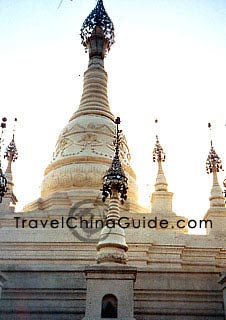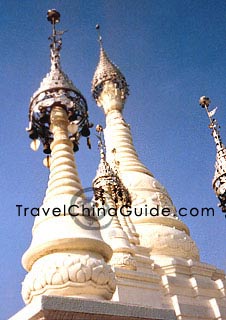Manfeilong Pagoda & Wild Elephant Valley
Manfeilong Pagoda
 |
| Manfeilong Pagoda |
The Manfeilong Pagoda consists of nine stupas. Seen from the distance, they look very like bamboo shoots that have emerged from the soil after the spring rain. They are made of bricks, with typical club-like bases topped by calabash shaped bodies. The principle and central stupa, which is 16.29 meters (53 feet) high, is surrounded by eight smaller stupas, each being 9.1 meters (30 feet) high. In each stupa, there is a niche wherein a statue of Buddha is laid. The bells hung at the top of the pagoda make a tinkling sound when the wind blows. Just to the south of the pagoda, there is a footprint on the rock. According to legend, this is the left footprint of Sakyamuni, the founder of Buddhism.
 |
| The white pagoda |
The Manfeilong Pagoda is decorated with beautiful sculpture, relief and colored paintings in the style of the Dai ethnic minority. During the Water-splashing Festival (usually on April 13-15), the villagers from the Manfeilong Village gather here and chase one another, splashing water as part of a welcome to the new year in Dai calendar.
| Admission Fee: | CNY 5 for the White Pagoda and free for the Black Pagoda |
| Recommended Time for a Visit: | Two hours |
| Opening Hours: | 08:30 to 18:00 |
Wild Elephant Valley
Sitting in the Sanchahe Valley of Mengyang Natural Reserve, Wild Elephant Valley is about 47 km (29 mi) from Jinghong City in Xishuangbanna Dai Autonomous Prefecture. It is actually a forest park more than a mere valley. In the 370 ha (914 acres) area live about 300 wild elephants. As the river here divides into three branches, it is also called “Trifurcate Lake Forest Park” (Sanchahe Forest Park).
The park includes an arena for performing elephants, a peacock garden, a butterfly breeding farm and a forest exploration tourist area. China’s first elephant training & performance school was established right here. From 11:00 to 12:00 and from 14:00 to 15:00 every day, sixteen tame elephants give interesting performances. Tourists can enjoy the performance for free and pay to take pictures with the elephants. A 920-meter long (1,006 yards) overhead corridor extends from Birds Garden near the south gate of the scenic area to Asian Elephant Museum near the north gate.
Some snazzy hotels are built among the big trees by the corridor. Staying in these unique hotels, visitors can see groups of wild elephants roaming in the forest during early morning and at night. If with good luck, elephants drinking and playing in the stream can also be appreciated.
At the gate of the park, a peacock garden dazzles visitors with a variety of peacocks and other birds. And the first artificial propagation butterfly farm in China shows visitors the whole growth process of brightly-colored butterflies. The forest exploration tourist area offers people a chance to learn about the habits of wild animals. In brief, the tropical forestry scenery is very beautiful. In the thick forests, many old roots emerge from the soil, old vines climb tall arbors and all kinds of plants mingle together, forming a fantastic living web.
Tips: To take pictures with a wild elephant, it costs CNY20-50 for reference.
| Opening Hours | 08:00 --18:30 |
| Admission Fee | CNY65 |
| Cable Car | Wild Elephant Valley cable car: Tropical forests sightseeing rope way: |
| Best Time to See Elephants | In the early morning and at night |
| Transportation | 1. Take a direct bus at Jinghong Coach Station to get there. The bus fare is CNY15/person for reference. 2. At the Xishuangbanna Passenger Transport Station, take a direct bus to the scenic area. |
- Last updated on Jul. 18, 2022 -